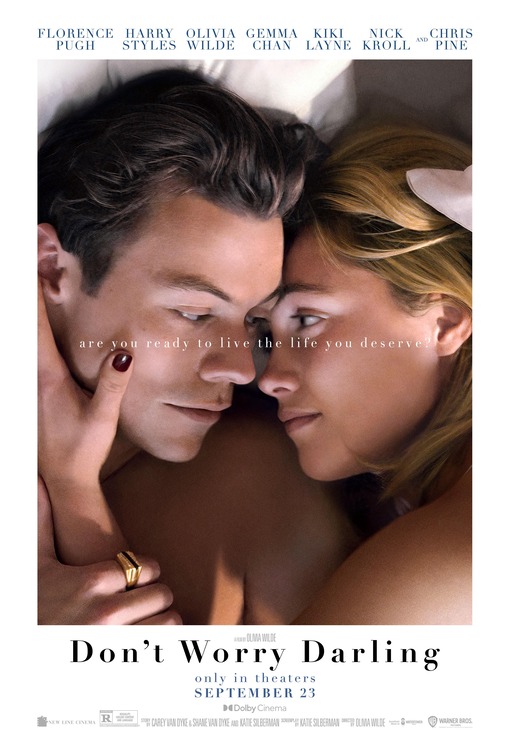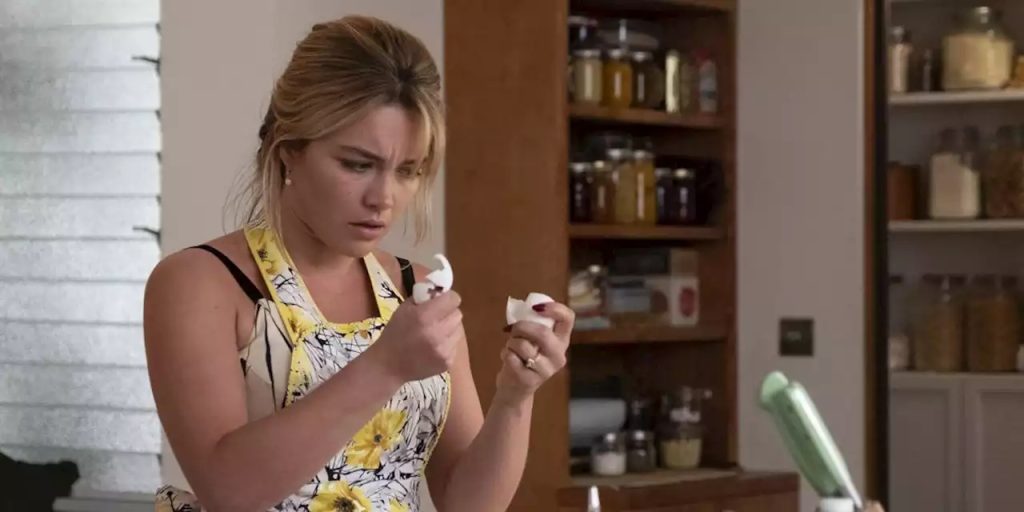
Even before Don’t Worry Darling was theatrically released on September 23, it was subjected to an onslaught of negative publicity. The tabloid shenanigans concerning certain key people were the fodder for rampant gossip. I’m being vague because this is Fast Film Reviews, not The Hollywood Reporter. I only bring it up because I’d bet the farm that the drama behind the scenes is 100x more interesting than the finished product.
The company town of Victory, California, is a traditional community in the 1950s. Husbands go to work while women stay home, do household chores, and socialize. Alice and Jack are a young attractive married couple in love. However, Alice begins to detect cracks in their seemingly idyllic existence. Bunny (director Olivia Wilde) is Alice’s best friend.
So let’s start with the good: The ensemble features an outstanding performance from Florence Pugh, looking radiant in Brigitte Bardot-style tresses. She is another UK actress (like Saoirse Ronan or Millie Bobby Brown) that is more convincing as an American woman than many of her peers. She did it perfectly in Midsommar, and now she’s done it again in another psychological thriller. Also worthy of mention is actor Chris Pine. He’s scary good as the enigmatic Frank — the founder of the “Victory Project.” A job to which the men all report every morning. Their departure in cars en masse is a spectacle. The details of their employment are shrouded in mystery.
I was captivated by the aesthetics. The production design is visually striking as it recreates this picturesque vision of suburban life in America. The cinematography is impressive too. Director of photography Matthew Libatique often partners with filmmaker Darren Aronofsky. Libatique’s effort draws upon his iconic visuals in Requiem for a Dream. Remember the repeated montage involving extreme close-ups of heroin as it cooks, boils, and enters the body? Well, substitute those sequences for bacon, eggs, and sliced toast as Alice makes breakfast every morning.
Ok, so now the bad? The script presents an unimaginative tale that is wholly derivative. Any deep dive into what happens here won’t withstand scrutiny. Why does Jack dance like a puppet for the men? What’s up with the hallucinations that feature choreography à la Busby Berkeley? Why do Bunny’s loyalties suddenly shift on a dime? Why does Frank’s wife (Gemma Chan) do what she does at the climax? Why do the aggressive (and unsexy) sex scenes never progress beyond third base? These are just a few of the questions I had. At least consulting the internet for answers made me feel I wasn’t alone. However, it didn’t resolve my confusion.
It feels like the screenwriters simply watched The Stepford Wives, drank a bottle of whiskey, and then wrote this movie. Ok, so it’s not *exactly* the same thing. (They threw in a little of The Matrix) Yet it’s so similar that the estate of author Ira Levin — who penned the 1972 novel — might be entitled to a cut of the profits. Katie Silberman gets credit for the screenplay based on a story by Carey Van Dyke, Shane Van Dyke, and Silberman. The best scene in the film is a dialogue at a dinner party that includes Alice and Frank while the guests look on. Sadly even the promise of that conversation doesn’t coalesce into anything meaningful. The plot didn’t offer surprises. The “twist” ending is a disappointment, although my predictive abilities remain acute. So no, this flick isn’t worth your time, but don’t worry, darling reader! I saw this, so you don’t have to.
09-22-22


4 Responses
I won’t go to see this movie, but I found your review engaging. In my humble opinion, some of your best work is on display when you are not rating a movie highly.
Ha ha. I’ve heard that before. I’ll take it…and thanks. 🙏🏼
Yes. Had great style, Florence and Chris were great, but what a confusing mess. 2 ⭐️
That dinner party scene between the two of them had such promise. (Still the best scene of the film.)